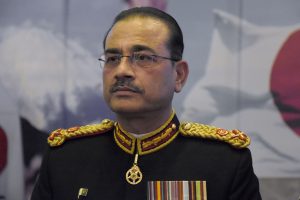Pakistani Prime Minister Shahbaz Sharif has named the country’s former spy chief as head of the military, the information minister said Thursday, ending months of speculation about the new appointment.
The army has historically wielded huge political influence in Pakistan, ruling it for half of its 75-year history, and also oversees the country’s nuclear program. Like neighboring China and India, Pakistan has nuclear arsenals and a missile system, which is mainly aimed at India.
Lt. Gen. Syed Asim Munir replaces Gen. Qamar Javed Bajwa, who completes his six-year extended term on November 29. Munir begins his new role amid bitter feuding between Sharif and former premier Imran Khan. Khan has publicly accused Bajwa of playing a role in his ouster, a charge the outgoing army chief has denied.
Khan wants snap elections and for Sharif to step down. Sharif, who replaced Khan through a no-confidence vote in parliament in April, has rejected the demand, saying the next polls will be held as scheduled in 2023.
There was no immediate comment from Khan about Munir, who was director general of the Inter-Services Intelligence when Khan was in office. Khan fired Munir without explanation.
On Thursday, Defense Minister Khawaja Mohammad Asif told reporters that Munir’s nomination as the army chief was “based on merit, law and according to the constitution.” He said he hoped that Alvi would not make the key appointments “controversial” and would endorse Sharif’s decision without any delay.
“It will also help our country and the economy to get back on the right track, as right now everything is at a standstill,” he said.
Azim Chaudhry, a senior political analyst, told The Associated Press that Munir held key positions under Bajwa, including head of military intelligence. He said he hoped the new army chief would keep the military away from politics, in line with Bajwa’s policy.
Information Minister Maryam Aurangzeb also said Sharif had named Lt. Gen. Sahir Shamshad Mirza as the chairman of the Joint Chiefs of Staff Committee to replace Gen. Nadeem Raza, who retires this week.
It is not clear if President Arif Alvi will immediately approve the appointments as he is a former member of Khan’s Tehreek-e-Insaf party. On Thursday, Alvi and Khan met in Lahore to discuss Munir’s nomination. Khan’s Tehreek-e-Insaf party did not comment on the meeting. Alvi was expected to issue a statement about his meeting later Thursday.
According to constitutional experts, Alvi was bound to approve the appointments. Aitzaz Ahsan, a senior constitutional expert, said that Alvi could delay the approval of the appointments for 25 days.
Also on Thursday, Interior Minister Rana Sanaullah Khan said Sharif on Thursday had promoted Munir to the rank of four-star general and that Munir would not retire this week even if Alvi delays the endorsement of his appointment as the army chief.
Khan extended Bajwa’s term in 2019 in the face of growing tension with India. But Khan later developed differences with Bajwa over the appointment of the country’s new spy chief in place of Lt. Gen. Faiz Hameed. These differences continued until Khan was ousted.
Since then, Khan has accused Bajwa of conspiring with the U.S. to force his government’s ouster — a charge Washington, Sharif and the military have repeatedly denied.
Bajwa, in a recent televised address at an army gathering, called Khan’s allegations a “false narrative.” “If there was a foreign conspiracy, would we be sitting silently? It would be a big sin,” he said, without naming Khan.
Bajwa said Wednesday the military had shown restraint so far, but issued what appeared to be a veiled warning toward Khan. “Keep it in mind that there is a limit to patience,” Bajwa said.
Alvi has hosted at least one meeting in the capital, Islamabad, between Khan and Bajwa as a part of an effort to reconcile them. But government and military officials say Alvi’s efforts failed as Khan continued hurling accusations at Bajwa.
The former cricket hero started a protest march from the eastern city of Lahore on October 28 before surviving a gun attack that killed a by-stander and wounded 13 others. Since then, Khan’s protest march has moved toward Islamabad in convoys without him.
Khan is expected to lead the protest march from Rawalpindi city on November 26.

































